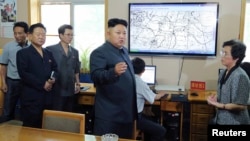North Korea recently held a foreign investment conference in Dalian, China to recruit businessmen to help develop designated international tourist areas along the coast of Wonsan district and in Mount Kumgang.
Participants at the event say they were impressed by the North's more open presentation, along with claims that economic reform is now the country's top priority.
Since Kim Jong Un came to power in 2011, analysts who study North Korea have been looking to see if the young, Swiss-educated leader would be able to consolidate power and introduce economic changes to the North's rigid, state-planned economy.
There has been no change in the diplomatic impasse over North Korea's nuclear program. Pyongyang continues to conduct nuclear bomb tests, missile launches and develop a reactor that experts say could one day make plutonium for atomic bombs.
Human Rights Watch says Kim Jong Un has had no positive impact on the country's dire human rights record. The group says more than 200,000 North Koreans, including children, are imprisoned in camps where many perish from forced labor, inadequate food, and abuse by guards.
But on the issue of economic reform, North Korea is beginning to change.
At this month's North Korean foreign investment meeting held in China, the 200 or so Korean businessmen in attendance were encouraged by what they heard. They said presentations were less dogmatic than in the past. There was an open question and answer session. Oh Eung-gil, the president of North Korea's Wonsan District Development General Corporation, tried to reassure the group, saying the door is wide open for investors in the country's tourist areas.
Economic analyst Kwon Tae-jin with the Center for North Korean and Northeast Asian Studies at the GSnJ Institute in Seoul said Pyongyang has also instituted reforms to collective farms, allowing smaller groups to mange the land and to keep a greater share of what they produce.
"This is very similar to what China adopted during its economic reform in 1987," he said.
Yang Moo-jin, a professor at the University of North Korean Studies, said economic reform is the stated priority of Kim Jong Un and the fact that these measures are moving forward are signs that he has consolidated control of the government.
"It would've been difficult for these two measures to be created if the power of Kim Jong-Un was not stabilized," he said.
International investors remain nervous about doing business with North Korea. Kwon Tae-jin said the government is still too vague about the tax incentives they offer and there are concerns about other possible restrictions. He cites as an example, Orascom, an Egyptian company that owns a large share of North Korea's mobile phone network but was not allowed to take their revenue out of the country.
"This is one of the factors that make investors hesitate to invest in the new local economic special zones as North Korea does not show trust to investors," he said.
Yang Moo-jin said that despite concerns over North Korea's nuclear ambitions, the international community should engage on these economic initiatives as a way to build trust.
"When North Korea is ready for reform through economic cooperation, it will have willingness and confidence in economic reform, and [the international community] can foster denuclearization at this point," he said.
However, these economic reforms will not likely bring an end sanctions or reduce international pressure on North Korea to end its nuclear program and improve its human rights record.
Seoul Bureau Producer Youmi Kim contributed to this report





